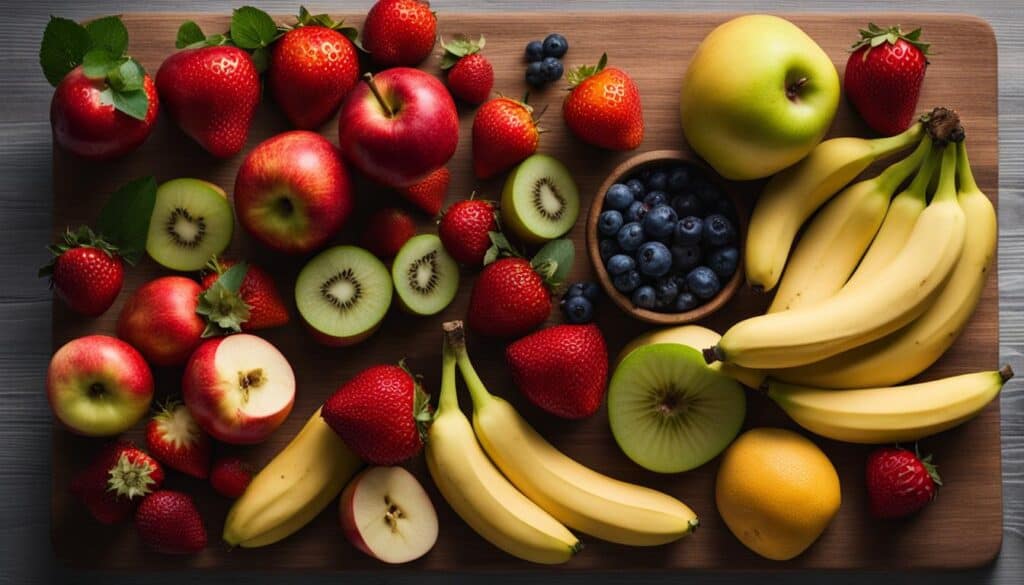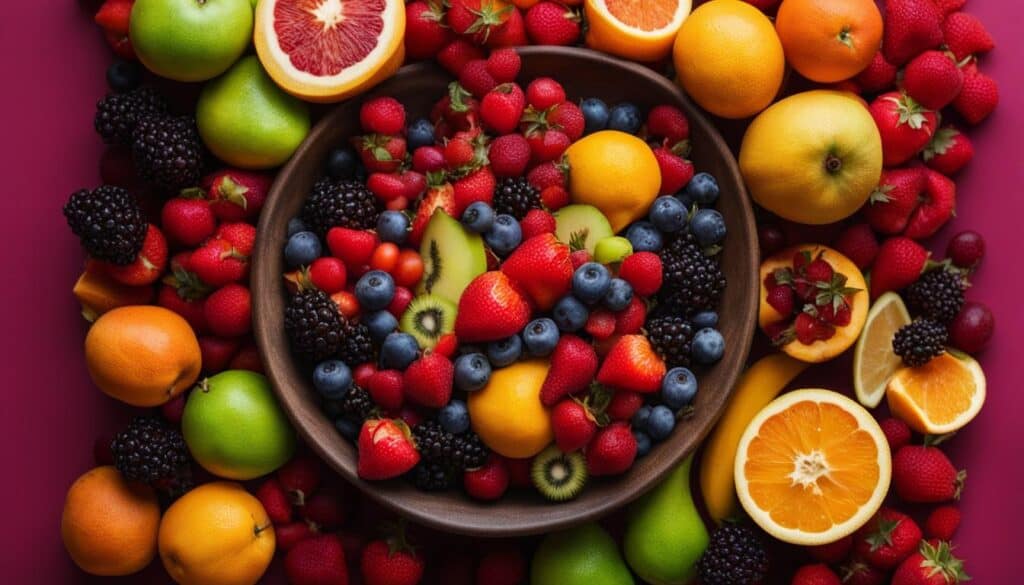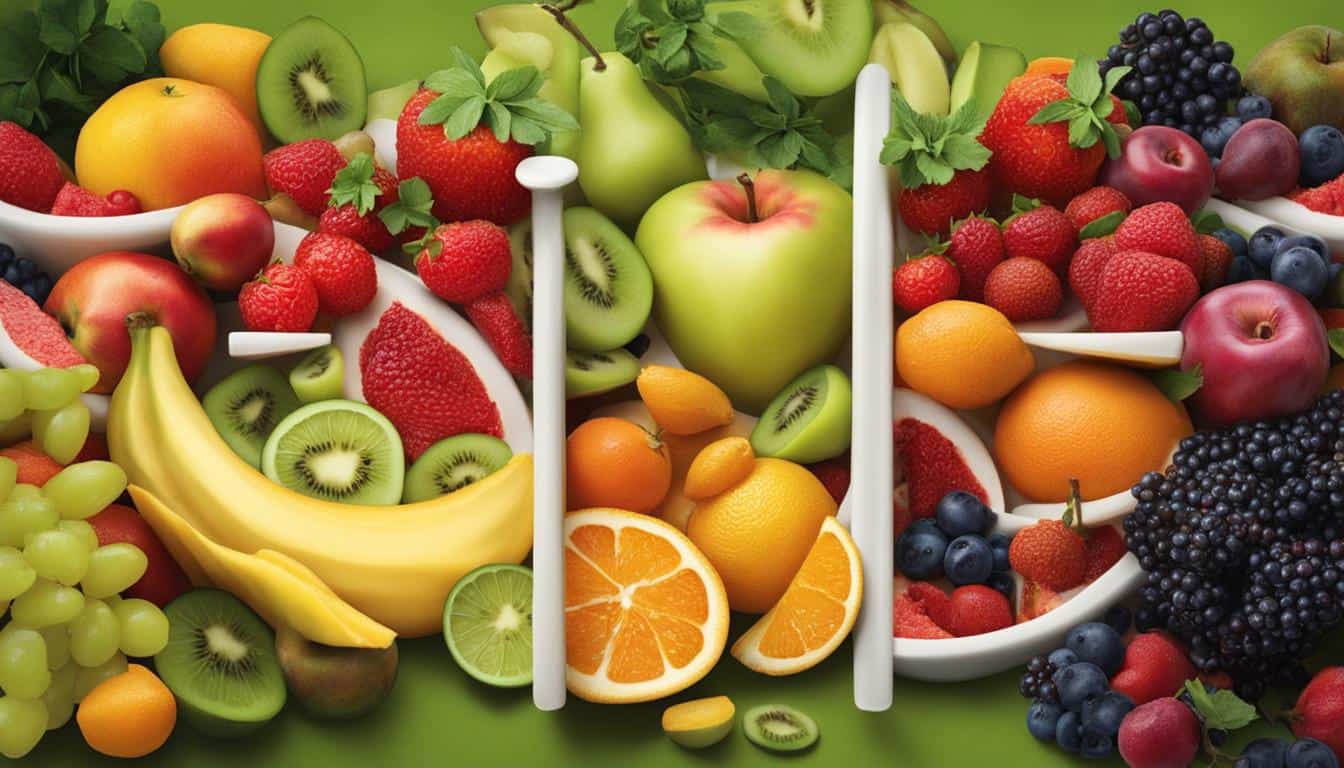Constipation is a common digestive issue that can cause discomfort and inconvenience. Many people wonder if eating fruit can be a contributing factor. Let’s explore the facts surrounding this topic based on information from various sources.
Key Takeaways:
- Eating fruit, especially those high in fiber, can promote regular bowel movements.
- Bananas, in particular, are a good source of fiber and contain beneficial compounds that aid in digestion.
- While some individuals may perceive bananas or other fruits to be constipating, it’s often due to excessive fiber intake without adequate fluid consumption.
- Other fruits like prunes, pears, and apples can also help relieve constipation due to their fiber content.
- A balanced diet, proper hydration, and regular physical activity are essential for maintaining healthy bowel movements.
Understanding Constipation and Fiber-Rich Foods
Constipation is a common digestive issue that can cause discomfort and inconvenience. Many people wonder if eating fruit can be a contributing factor. Let’s explore the facts surrounding this topic based on information from various sources.
Constipation is defined as having infrequent bowel movements, which may be hard and difficult to pass. Increasing fiber intake is often recommended to alleviate constipation. Fruits, especially those high in fiber, can be beneficial in promoting regular bowel movements.
When it comes to constipation, fiber-rich foods play a crucial role. Fiber adds bulk to the stool, making it easier to pass through the digestive tract. It also helps to soften the stool, preventing it from becoming hard and difficult to eliminate. Fruits like berries, apples, pears, and oranges are excellent sources of fiber.
“Eating fruits that are high in fiber can help regulate bowel movements and prevent constipation,” says Dr. Jane Smith, a renowned gastroenterologist.
In addition to fiber, fruits also provide essential vitamins, minerals, and antioxidants that support overall digestive health. It’s important to note that individual responses to fruits may vary, so it’s best to consume a variety of fruits and monitor how they affect your bowel movements.
| Fiber-Rich Fruits | Fiber Content per 100g |
|---|---|
| Apples | 2.4g |
| Pears | 3.1g |
| Oranges | 2.4g |
| Berries (strawberries, raspberries, blueberries) | 2-3g |
The Fiber Content in Bananas and Its Impact on Digestion
When it comes to constipation and fruit, one fruit that often comes to mind is bananas. Bananas are known for their high fiber content, which can play a role in promoting healthy digestion and preventing constipation. In fact, bananas contain both soluble and insoluble fiber, making them a beneficial addition to a fiber-rich diet.
Soluble fiber found in bananas forms a gel-like material in the digestive tract, softening the stool and making it easier to pass. This type of fiber can help alleviate constipation and promote regular bowel movements. On the other hand, insoluble fiber adds bulk to the stool, aiding in its movement through the digestive tract. Together, these two types of fiber contribute to maintaining a healthy gastrointestinal system.
In addition to fiber, bananas contain other compounds that can impact digestion. One such compound is sorbitol, a sugar alcohol known for its laxative effects. Sorbitol helps draw water into the intestines, softening the stool and promoting bowel movements. Another beneficial compound found in bananas is resistant starch. This type of starch resists digestion in the small intestine and serves as food for beneficial gut bacteria, supporting overall digestive health.
| Type of Fiber | Impact on Digestion |
|---|---|
| Soluble Fiber | Softens stool, promotes regular bowel movements |
| Insoluble Fiber | Adds bulk to stool, aids in movement through the digestive tract |
| Sorbitol | Laxative effects, draws water into the intestines |
| Resistant Starch | Supports beneficial gut bacteria, aids in digestion |
While bananas are generally considered beneficial for digestion and can help prevent constipation, it’s important to note that individual responses may vary. Some people may experience constipation if they consume excessive amounts of fiber without adequate fluid intake. It’s crucial to maintain a balanced diet and stay hydrated to support healthy digestion. If you have any concerns or persistent digestive issues, it’s always best to consult with a healthcare professional for personalized advice and guidance.
The Potential Link Between Bananas and Constipation

When it comes to the potential link between bananas and constipation, there are differing opinions. While some individuals believe that bananas can contribute to constipation, there is limited research specifically on this topic. It is important to note that individual responses may vary, and other factors such as overall diet and fluid intake play a role in bowel movements.
Bananas are known to be a rich source of fiber, which is essential for maintaining regular bowel movements. The soluble fiber in bananas forms a gel-like substance that aids in softening the stool, while the insoluble fiber adds bulk to promote movement through the digestive tract. Additionally, bananas contain sorbitol, a sugar alcohol with laxative effects, and resistant starch, which can help prevent constipation.
However, excessive consumption of fiber, including from bananas, without adequate fluid intake can potentially lead to constipation. It is important to maintain a proper balance in fiber consumption and ensure adequate hydration. Gradually increasing fiber intake and incorporating a variety of fruits and vegetables into the diet can help prevent constipation and promote overall digestive health.
The Potential Link Between Bananas and Constipation:
| Fruit | Fiber Content (per medium-sized fruit) | Laxative Effects |
|---|---|---|
| Bananas | 3 grams | Sorbitol, resistant starch |
| Prunes | 2 grams | Sorbitol, fiber |
| Pears | 5 grams | Fiber |
| Apples | 4 grams | Fiber |
It is important to consider the overall balance of the diet and lifestyle factors when it comes to constipation. While bananas can be a part of a healthy diet and contribute to regular bowel movements, it is advisable to consult a healthcare professional or dietitian for personalized guidance based on individual needs and concerns.
The Role of Other Fruits in Relieving or Exacerbating Constipation
When it comes to relieving constipation, certain fruits can play a beneficial role in promoting regular bowel movements. Prunes, pears, and apples are examples of fruits that contain natural compounds which aid in relieving constipation. These fruits are not only delicious but also high in fiber, which adds bulk to the stool and supports healthy digestion.
It’s essential to consume the whole fruit rather than just the juice to fully benefit from its fiber content. The fiber in these fruits helps soften the stool and increases its bulk, making it easier to pass. Adding these fruits to your diet can stimulate regular bowel movements and alleviate constipation.
Incorporating a variety of fruits into your daily intake can provide additional benefits for maintaining regularity. Berries, such as raspberries and blackberries, are also rich in fiber and can contribute to a healthy digestive system. Furthermore, tropical fruits like papaya and mango contain enzymes that aid in digestion and can support regular bowel movements.
The Role of Prunes in Relieving Constipation
Prunes, in particular, have long been associated with relieving constipation due to their high fiber content and natural laxative properties. They are an excellent source of both soluble and insoluble fiber, which helps regulate bowel movements. Studies have shown that consuming prunes or prune juice can increase stool frequency and improve overall bowel regularity.
| Fruit | Fiber Content (per 100g) |
|---|---|
| Prunes | 7g |
| Pears | 3.1g |
| Apples | 2.4g |
| Raspberries | 6.5g |
| Blackberries | 5.3g |
It’s worth noting that while fruits can aid in relieving constipation, individual responses may vary. Some people may find that certain fruits exacerbate their symptoms. It’s essential to listen to your body and determine which fruits work best for you. Additionally, it’s crucial to maintain a balanced diet, drink plenty of water, and engage in regular physical activity to support optimal digestive health.
Dietary Tips and Lifestyle Changes to Prevent Constipation
Eating a high-fiber diet that includes a variety of fruits and vegetables can help prevent constipation and promote healthy bowel movements. Here are some tips to incorporate into your daily routine:
Gradually Increase Fiber Intake
When adding more fiber to your diet, it’s important to do so gradually. This allows your digestive system to adapt and reduce the likelihood of discomfort or bloating. Start by incorporating small amounts of fiber-rich foods, such as fruits, vegetables, and whole grains, and gradually increase the portion sizes over time.
Stay Hydrated
Drinking an adequate amount of water is essential for maintaining regular bowel movements. Fiber absorbs water, adding bulk to the stool and promoting its smooth passage through the intestines. Aim to drink at least 8 cups (64 ounces) of water per day, and more if you engage in strenuous physical activity or live in a hot climate.
Engage in Regular Physical Activity
Regular exercise stimulates the muscles in your intestines, helping to move stool through the digestive system. Aim for at least 30 minutes of moderate-intensity exercise, such as brisk walking, jogging, cycling, or swimming, on most days of the week. Find activities that you enjoy to make it easier to stick to a regular exercise routine.
Consider Other Lifestyle Factors
In addition to dietary changes, certain lifestyle factors can also contribute to constipation. Managing stress levels, getting enough sleep, and establishing regular bathroom habits can all help promote regular bowel movements. Take time to relax and unwind, prioritize sleep, and make sure to listen to your body’s natural signals for bowel movements.
Consult a Healthcare Professional
If you’re struggling with persistent constipation despite dietary and lifestyle changes, it’s important to consult a healthcare professional. They can evaluate your symptoms, provide individualized advice, and recommend any necessary medical interventions or treatments.
Addressing Misconceptions Regarding Dairy and Probiotics

There are several misconceptions surrounding the relationship between dairy, probiotics, and constipation. It is important to address these misconceptions to better understand their impact on digestive health. Contrary to popular belief, there is no need to eliminate dairy from the diet to improve constipation. In fact, dairy products such as yogurt and kefir contain probiotics, which are beneficial bacteria that can support gut health.
Probiotics have been shown to help reduce symptoms such as bloating and gas, but further research is needed to make specific recommendations regarding their role in constipation management. While some studies suggest that certain strains of probiotics may help alleviate constipation, the overall effectiveness may vary among individuals. Therefore, it is advisable to consult a healthcare provider or registered dietitian for personalized guidance on the use of probiotics for constipation.
When considering dietary changes to address constipation, it is important to focus on overall fiber intake rather than solely eliminating dairy. Incorporating a variety of fiber-rich foods, including fruits, vegetables, whole grains, and legumes, can help promote regular bowel movements. Adequate hydration is also crucial to support proper digestion and prevent constipation. It is recommended to drink an adequate amount of water and avoid excessive consumption of caffeine and alcohol, as they can contribute to dehydration.
In summary, dairy products can be included as part of a balanced diet to support digestive health. While probiotics may offer potential benefits for constipation management, more research is needed to determine their efficacy. A holistic approach that includes a high-fiber diet, hydration, and regular physical activity is key to preventing and alleviating constipation. Consulting a healthcare professional or registered dietitian can provide personalized recommendations based on individual needs and concerns.
Table: Common Myths About Dairy and Probiotics
| Myth | Fact |
|---|---|
| Dairy products cause constipation | Dairy products, such as yogurt and kefir, can actually support gut health due to their probiotic content. |
| Probiotics can cure constipation | While probiotics may have potential benefits for constipation management, more research is needed to determine their effectiveness. |
| Cutting out dairy improves digestion | Eliminating dairy is not necessary for constipation management. It is important to focus on overall fiber intake and hydration. |
Identifying the Right Time to Seek Medical Attention

When it comes to constipation, most cases can be managed through dietary changes and lifestyle adjustments. However, there are certain situations where seeking medical attention is necessary. If you experience any of the following, it’s important to consult a healthcare provider for further evaluation:
- Consistent and severe abdominal pain
- Rectal bleeding or blood in the stool
- Unexplained weight loss
- Persistent constipation that lasts for more than two weeks
- Sudden changes in bowel movements accompanied by other concerning symptoms
These symptoms may indicate underlying conditions that require medical intervention. Additionally, if dietary changes and other home remedies do not provide relief from constipation, consulting a healthcare professional can help identify the underlying cause and develop an appropriate treatment plan.
Remember, while certain fruits can contribute to constipation, each individual may respond differently. It’s important to listen to your body and make adjustments accordingly. By maintaining a balanced diet, staying hydrated, and adopting a healthy lifestyle, you can support regular bowel movements and overall digestive health.
Conclusion
After exploring the facts surrounding the relationship between fruits and constipation, it is evident that certain fruits, such as bananas, can actually promote regular bowel movements. This is due to their high fiber content, including both soluble and insoluble fiber, as well as beneficial compounds like sorbitol and resistant starch.
However, it is important to note that individual responses may vary. While some people may find relief from constipation by consuming fruits, others may not experience the same effect. It is crucial to maintain a balanced diet that includes a variety of fruits and vegetables, stay adequately hydrated, and lead a healthy lifestyle to prevent and alleviate constipation.
If you have concerns about constipation or are experiencing sudden changes in bowel movements, it is advisable to consult a healthcare professional or a registered dietitian. They can provide personalized guidance based on your individual needs and address any specific concerns you may have.
FAQ
Can eating fruit cause constipation?
No, eating fruit is generally not a cause of constipation. In fact, fruits high in fiber can promote regular bowel movements and help alleviate constipation.
Are bananas constipating?
While there isn’t extensive research specifically on bananas causing constipation, some individuals may perceive them to be constipating if they consume excessive amounts of fiber or have a diet high in fiber without adequate fluid intake. Balancing fiber consumption is essential to prevent constipation.
Do other fruits impact bowel movements?
Yes, other fruits, such as prunes, pears, and apples, can aid in relieving constipation. These fruits are high in fiber and can promote regularity. It’s important to consume the whole fruit to benefit from its fiber content, rather than just the juice.
What dietary tips can prevent constipation?
Incorporating a high-fiber diet that includes a variety of fruits and vegetables can aid in preventing constipation. It’s important to gradually increase fiber intake, stay hydrated, and engage in regular physical activity to support healthy bowel movements.
Should dairy be eliminated from the diet to improve constipation?
No, there is no need to eliminate dairy from the diet to improve constipation. Probiotics may help reduce symptoms like bloating and gas, but further research is needed to make specific recommendations. Consulting a dietitian can provide personalized guidance.
When should medical attention be sought for constipation?
Most cases of constipation can be managed through dietary changes and lifestyle adjustments. However, if there are concerns about constipation, sudden changes in bowel movements, or if dietary changes do not provide relief, it is advisable to consult a healthcare provider for further evaluation.





Leave a Reply